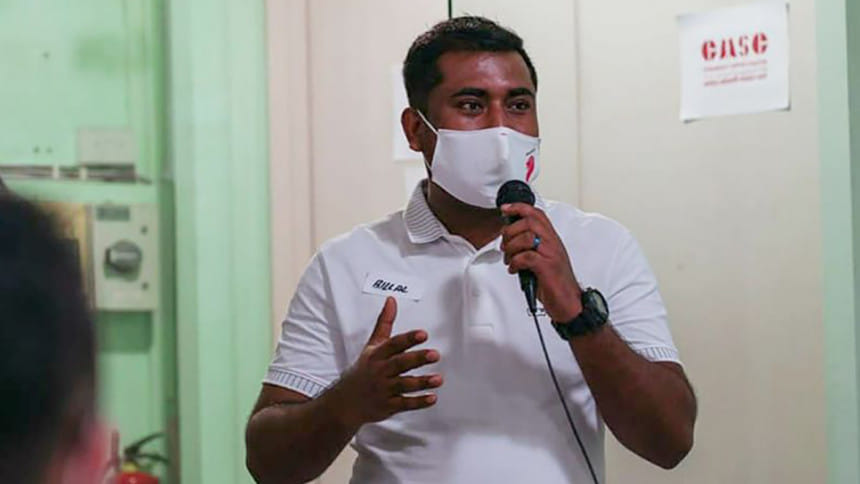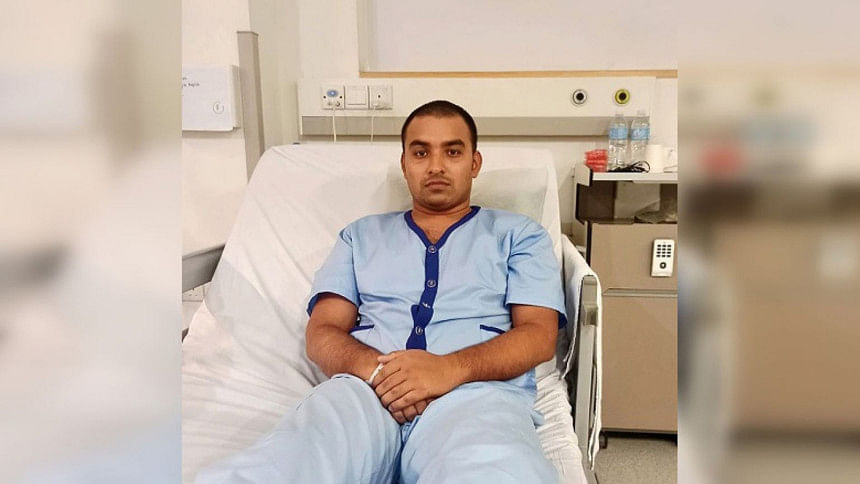Bangladeshi workers in Singapore taking on leadership roles during Covid-19

It is almost dawn when Bangladeshi worker Billal Khan, 28, completes his 11-hour night shift on the MRT tracks, installing noise barriers along viaducts, and returns to his factory-converted dormitory in Singapore.
But his work is not done. At 11:00am, the senior site supervisor logs on to the Facebook page he created - Overseas Foreign Workers in Singapore. He then reads the news and looks for articles that have been translated into Bengali to decide which to share with his more than 5,000 followers. Some days, he has to translate the news stories himself.
The page, created in April, keeps workers updated on the Covid-19 pandemic and initiatives, such as where they can get free top-up cards.
Billal also partners with non-governmental organisations (NGOs) such as Geylang Adventures and Migrant Matters to deliver essential items, such as toiletries, to workers. He has given out more than 6,000 masks, 3,000 Singtel top-up cards, 1,000 bottles of soap and shampoo, and 100 mattresses so far.

Volunteering is not new to him. When he was in high school, he founded a charity in his home town in Cumilla, Bangladesh.
He facilitated a group chat to collate the needs of lower-income families around his neighbourhood. He organised donation drives to raise funds and collect items such as rice and vegetables to distribute to the families. The charity ran for three years before coming to a stop in 2010 when he left for Singapore.
Like Billal, several foreign workers have stepped forward to take the lead in their communities during the pandemic. Some counselled others, acted as go-betweens with NGOs and even assisted dorm staff during lockdowns.
Bridging the information gap
Another Bangladeshi worker, Zasim, 27, who goes by one name, was appointed an ambassador for the Migrant Workers' Centre (MWC), an NGO that caters to the well-being of workers.
From March, the safety supervisor answered about 30 calls a day from fellow workers worried about how much they would be paid.
But in May, Zasim was diagnosed with Covid-19. While at Khoo Teck Puat Hospital from May 5 to 19, he posted videos on his Facebook page documenting his recovery.
The videos were later used by the Ministry of Manpower (MOM) on its Facebook page to show the treatment that Zasim received during his hospitalisation.
He said he wanted to assure other workers they would be well cared for if they contracted the coronavirus. "Everyone will believe me since I'm the person with Covid-19," said Zasim.
When he recovered, he worked with a group started by students at Tanglin Trust School, called Migrant Support Group, that wanted to collect essential items for workers. Zasim suggested pillows, detergent, instant noodles, coffee and cereal, and the students ran donation drives to collect them. They managed to get enough for 1,000 workers and delivered the care packs to their dormitories.
Caring for those around them
When the Westlite Mandai dorm was in lockdown, construction worker Dhanam Athiban, 28, volunteered to assist medical staff conducting swab tests.
He also delivered meals to workers unable to leave their rooms. He had to undergo training by MOM officers, particularly on how to wear personal protective equipment.
The Westlite dorm managers later paid him $25 a day for his help. The experience was eye-opening as he had volunteered in the past to only clean villages near his home town in Ramanathapuram, India.
"There are people here from different countries who speak different languages and eat different food," Dhanam said. Some dorm residents also called on him to help with sending money to their families so that they would have cash to purchase household necessities.
He also became the go-to guy for many workers who opened up and shared their concerns about work and their loved ones back home with him. "Around 90 per cent of them have become my friends. That is my biggest happiness," he said.
Ahmed Amad, 34, was appointed by his employer to oversee 100 workers staying at his company's factory-converted dorm.
In addition, since taking charge in March, the Bangladeshi health and safety supervisor worked with NGOs like MWC and Transient Workers Count Too to arrange for masks, fruits and other items to be delivered to the workers.
His gesture touched the hearts of many of his fellow residents, including Bangladeshi sanitation plumber Miah Razib, 28, who said: "Ahmed arranged it all on his own. We did not tell him to do it."
Another dorm resident, Indian national Kajapathy Iyappan, 28, said Ahmed treats everyone as equals. "He does not see Indians or Bangladeshis differently," he said.
He also referred to Ahmed as his "guru" for encouraging him to enrol in a driving school for a Class 3 licence. After getting his licence, Iyappan was promoted to lorry driver and received a $100 pay rise.
Meanwhile, Billal's success on Facebook continues. Bengali media site 24asia.news asked him to manage its Facebook page, which has more than 100,000 members.
But Billal declined. He did not want to give up his own page. "I do not need to be famous," he said. "I'm just doing my part for my migrant brothers."

 For all latest news, follow The Daily Star's Google News channel.
For all latest news, follow The Daily Star's Google News channel. 



Comments